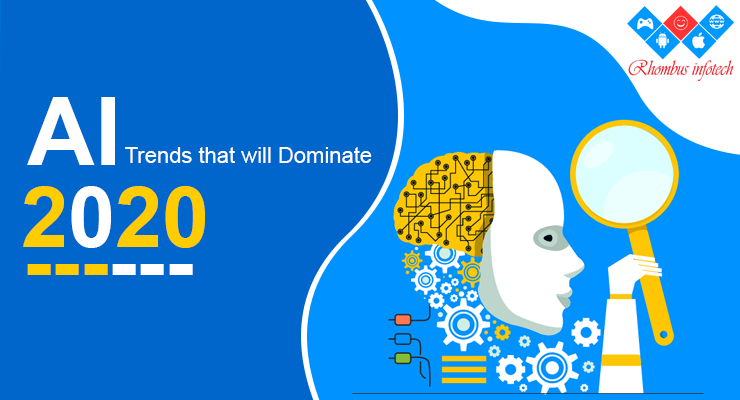AI is something where software acts as humans and shows human-like behavior. It has always been seen, witnessed and predicted as something with great potential. It is becoming significant enough to make us sit at a comfortable level relaxing — while some of our chores are taken care of better than we could do them. AI is saving our time and consuming less of our energies and efforts to get things done.
Artificial Intelligence, most commonly known as AI was a prediction for decades but was initially associated with robots only. However, AI is incorporated in almost everything we use today — and we call it “smart.”
With the arrival of 2020, we are likely to see AI, bringing radical changes in many aspects, be it organizations, business models, innovations, and cultures.Take a sneak Peak at AI trends that will dominate 2020.
1. AI-Driven Media and Entertainment
While AI has not penetrated the creative industries, it is likely to do so in 2020. Let’s look at these facts. The economics of gaming and movie production has a high cost. So, if you consider the fact that only one in ten films are profitable, it is apparent that the use of AI in this sector is inevitable. AI can play a role in the development of stories, production, scriptwriting, and even acting.
2. AI-Powered Cybersecurity Systems
The sophistication and scale of cyberattacks are increasing at a faster rate, outpacing existing defensive measures. Actually, humans are no match to today’s cybercrime tricks. Cyber-threat hunting is a proactive approach to detect malicious attackers and prevent activities initiated by these criminals. For this reason, AI systems will continue to play a significant role in managing these attacks. Using machine learning, organizations can detect such security breaches with ease.
3. AI Will Disrupt Traditional Industries
More and more organizations have realized that AI is a must-have survival tool. With the introduction of self-driving cars, traditional auto manufacturers need to evolve, or they will become irrelevant.
Even AI champions like Google and other traditional incumbents are finding it necessary to become customers or form alliances with AI startups. It is clear that in a post-AI world, the success of enterprises will depend on their ability to prepare their human resources for disruption.
4. The Convergence of Blockchain, IoT, and AI
For AI to make a positive impact, it should be integrated with other technologies. For instance, self-driven vehicles might not make much sense without IoT working with AI. The IoT activates and regulates the sensors in the car that collect real-time data, whereas the AI models are what the vehicle needs for decision making. Likewise, Blockchain can work closely with AI to address security, scalability, and trust issues.
5. AI Will Drive Real-Time Customer Interactions
As we move into 2020, more marketing activities will become truly real-time, and they will be driven by AI. With the help of AI, organizations will manage real-time customer interactions across all channels. And as an overarching benefit, these companies will employ AI marketing to improve their customer retention. Defecting customer win-back and first-time to active, and other critical campaigns will all use AI.
Aside from its ability to improve customer interactions, AI can help marketers in targeting new audiences across social media and other platforms.
6. Intelligent Automation in the Workplace
While AI will displace a few specific jobs, such as truck drivers, most of the reporting on this issue has been somehow biased. According to Gartner’s predictions, AI will eliminate about 1.8 million jobs by 2020. But it will replace it with about 2.3 million jobs, therefore, discrediting the assumption that AI will take away human jobs. In most cases, increased efficiency has resulted in more jobs with higher compensation.
AI trends 2020 and automation will create jobs mainly in sectors where they can be deployed more effectively, such as retail, manufacturing, banking, and insurance.
7. AI Assistants Will Rise
AI assistants can streamline and automate mundane customer service and sales tasks. We already have popular assistants, such as Siri, Alexa, Cortana, and Google Assistant. An increasing number of companies have adopted intelligent assistants to handle basic tasks. And moving into 2020 and beyond, there will be more application of AI assistants. ComScore predicts that, by 2020, about half of all searches will be carried out through voice.
8. Biased Data
Over the last few years, some organizations have relied on machine learning models to assist them in critical decision-making, such as hiring and mortgage loan approval. Unfortunately, this trend might lead to biased data. For instance, traditional employment data indicates that women are promoted less often than men, which might create a discriminatory AI-based application.
9. Facial Recognition
Facial recognition is a trusted form of biometric authentication. Due to the massive investment and deep research in this area, this AI application’s accuracy and readability have improved significantly over the last few years. With the help of AI, we are most likely to see a drift in the usage of facial recognition technology with precision in 2020.
10. Privacy and Policy
The introduction of the GDPR was one of the main privacy and policy conversational concerns in 2018, which also spill over to 2019. In 2020, we are likely to see an increased concern about the need to safeguard individual privacy. Some of the concerns have been triggered by the latest development in the AI sector.

